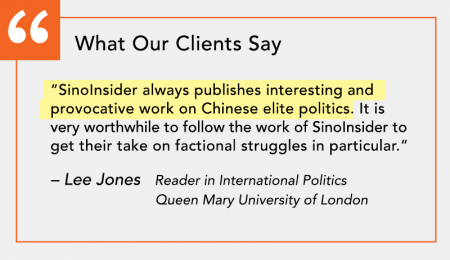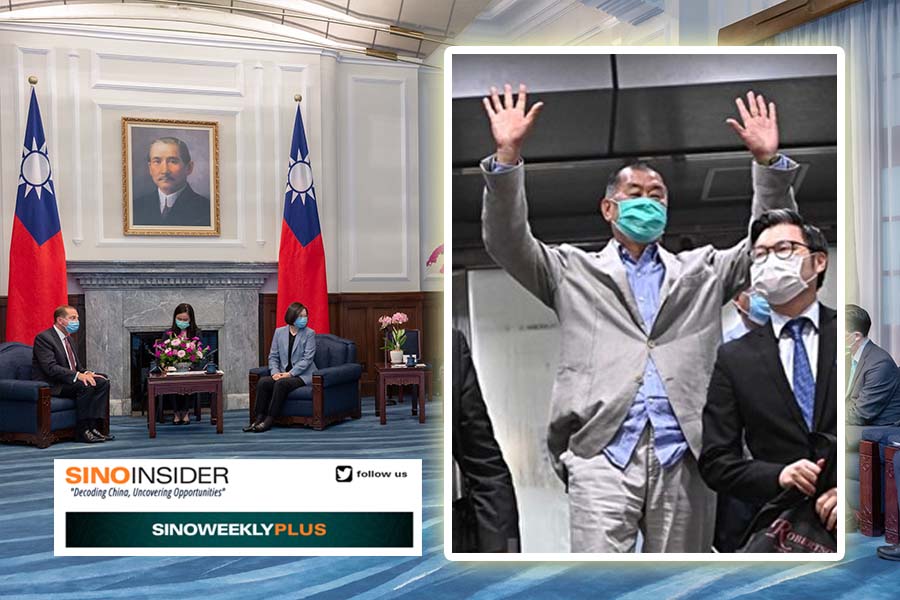◎ The following analysis was first published in the Aug. 13 edition of our subscriber-only SinoWeekly Plus newsletter. Subscribe to SinoInsider to view past analyses in our newsletter archive.
Sino-U.S. “new cold war” considerations shaped events in Taiwan and Hong Kong earlier this week, as well as Secretary of State Mike Pompeo’s visit to the Czech Republic:
Aug. 10
- U.S. Health Secretary Alex Azar touchdowned in Taiwan for a three-day trip. Azar is the first senior U.S. official to visit Taiwan in four decades. In a meeting with Taiwan leader Tsai Ing-wen, Azar said, “Taiwan’s response to Covid-19 has been among the most successful in the world, and that is a tribute to the open, transparent, democratic nature of Taiwan’s society and culture.”
- PLA Air Force J-10 and J-11 fighter jets briefly trespassed across the midline of the Taiwan Strait shortly before Secretary Azar’s meeting with Tsai. Taiwan’s defense ministry reported that the PLA aircrafts were tracked by land-based Taiwanese anti-aircraft missiles and “driven out” by Taiwanese aircraft on patrol.
- Hong Kong police arrested 10 pro-democracy activists, including prominent figures like Apple Daily founder Jimmy Lai and former Demosistō member Agnes Chow, under the new National Security Law. About 200 police also raided the Apple Daily newsroom and confiscated material.
- Vice President Mike Pence criticized the arrest of Jimmy Lai as “deeply offensive and an affront to freedom loving people around the world.” Secretary Mike Pompeo said the arrest of Lai under the “draconian National Security Law” is “further proof that the CCP has eviscerated Hong Kong’s freedoms and eroded the rights of its people.”
- According to the Chinese language Hong Kong edition of The Epoch Times (English report), several of their Hong Kong journalists reported being tracked by presumed PRC Ministry of State Security agents.
- The U.S. Embassy in Beijing and consulates in the PRC eliminated the word “China” from their seal to feature only the location name (e.g. from “China, Beijing” to “Beijing”). U.S. officials explained the rewording was part of a global redesign irrelevant to worsening Sino-U.S. relations.
Aug. 11
- In a speech at National Taiwan University, Secretary Azar praised Taiwan’s “model of excellence” in handling the Wuhan coronavirus, and said: “Taiwan’s approach to combating the virus through openness, transparency, and cooperation stands in stark contrast to the country where the virus began. The Chinese Communist Party had the chance to warn the world and work with the world on battling the virus. But they chose not to, and the costs of that choice mount higher every day.”
- All Hong Kong pro-democracy activists arrested the previous day were released on bail. The fact that the activists were released so quickly on bail is noteworthy because Article 42 of the National Security Law reads: “No bail shall be granted to a criminal suspect or defendant unless the judge has sufficient grounds for believing that the criminal suspect or defendant will not continue to commit acts endangering national security.” In other words, if prominent activists like Jimmy Lai and Agnes Chow were allowed bail, because it was deemed they would not keep “endangering national security,” then their arrest on national security grounds is highly questionable.
Aug. 12
- Secretary Azar revealed that his talks in Taiwan touched upon a “bilateral trade arrangement,” but did not elaborate. On the same day, Tsai Ing-wen disclosed in an online forum organized by the Hudson Institute and the Center for American Progress that she wants to start talks on a free-trade pact with the United States.
- In a speech titled “Securing Freedom in the Heart of Europe,” Secretary Pompeo said that the CCP has “a Marxist-Leninist core no less than the Soviet Union did, and indeed, perhaps more so. The Party has always put itself first. Its actions flow from its ideology. And it’s paranoid about free societies like ours.” He added, “What’s happening now isn’t Cold War 2.0. The challenge of resisting the CCP threat is in some ways much more difficult. That’s because the CCP is already enmeshed in our economies, in our politics, in our societies in ways the Soviet Union never was.” And while “Beijing is not likely to change course in the near future, although one lives in hope,” Pompeo said, referencing the fall of the Berlin Wall. Pompeo also said, “Americans now recognize that the CCP, which is totally separate from the Chinese people, threatens their values and their way of life. Both parties in Washington agree on very little, but on this, we all know what we’re up against.”
- In a discussion presented by the Center for Strategic and International Studies, Assistant U.S. Attorney General for National Security John Demers said that the PRC Houston consulate was “not chosen at random” for closure. The U.S. government was looking to terminate “what we had been tracking for some time,” namely, “industrial and intellectual property espionage for China’s benefit.”
Aug. 13
- People’s Liberation Army Eastern Theater Command spokesman Senior Colonel Zhang Chunhui said the theater command had recently conducted military drills in the Taiwan Strait and to the north and south of Taiwan. “Recently, some major powers have persisted in a negative trend on the Taiwan issue, sending a serious and negative signal to those Taiwanese independence forces, and seriously threatening the safety and stability of the Taiwan Strait … the patrols and exercises by the command’s forces were a response to the security situation of the Taiwan Strait and a necessary measure to safeguard national sovereignty,” Zhang said.
- The Trump administration designated the Confucius Institute U.S. Center as a foreign mission of the PRC. In a statement, Secretary Pompeo said “Confucius Institutes are funded by the PRC and are part of the Chinese Communist Party’s global influence and propaganda apparatus.”
- Pompeo traveled to Slovakia for consultations. According to a State Department statement, Pompeo will sign the U.S.-Slovenia Joint Declaration on 5G Security and the U.S.-Slovenia Joint Declaration on 5G Clean Network Security after bilateral meetings.
Our take
1. In the Aug. 10 edition of this newsletter, we wrote that the CCP “fears the worst case scenario where America formally ends diplomatic ties with the PRC and recognizes the ROC.” Given the CCP’s concerns, paranoia, and classic propaganda operations, the high-profile arrest of Jimmy Lai and other Hong Kong pro-democracy activists were certainly timed and designed to distract and capture headlines, and draw attention away from Secretary Alex Azar’s significant and symbolic trip to Taiwan.
We believe the Trump administration is unlikely to formally end diplomatic ties with the PRC and recognize Taiwan, but will still continue to take actions that amount to symbolic recognition of the ROC over the PRC. Indeed, the Trump administration has clearly been “salami-slicing” the CCP on the Taiwan issue since President-elect Donald Trump received a congratulatory call from Tsai Ing-wen in December 2016. Since the Trump-Tsai call, the U.S. has gradually strengthened its relations with Taiwan through arms sales ($10 billion in 2019), increased frequency of military maneuvers in the Taiwan Strait, and passing key legislation. The U.S. could next establish international healthcare, economic networks or organizations that feature Taiwan as a member.
2. Aside from drawing attention away from Taiwan, the arrests of Jimmy Lai and others in Hong Kong also serve two other goals for the CCP regime.
By engineering headline incidents, the CCP also distracts the Chinese people and the world from scrutinizing the PRC’s severe economic problems, food shortages (see SinoInsight 2), and other regime-threatening issues. Through various distractions (including the recent Sino-Indian border clash), the CCP is likely hoping to buy time to resolve its immediate problems and attain more regime security before it is exposed. The distractions, however, are a double-edged sword, providing further evidence and ammunition for the now hypervigilant U.S. to challenge the CCP.
The CCP is also laying groundwork with the arrest of Lai and others to “rectify” the long-term problem of Falun Gong in Hong Kong (see previous analysis here and here). Once the pro-democracy camp is weakened or even silenced, there will be few left to speak up for Falun Gong when the CCP decides to perpetuate its persecution campaign in Hong Kong. The tailing of journalists from the Hong Kong edition of The Epoch Times, a media outlet founded by Falun Gong adherents, is an ominous sign the CCP is preparing to pounce.
3. Secretary Pompeo’s speech in the Czech Republic continues the Trump administration’s ideological confrontation against the CCP. Because ideological confrontation is anathema to the CCP, it will be increasingly compelled to use “unrestricted warfare” tactics against the U.S., including doubling down on the “racism” card in the lead up to the U.S. presidential election in November, as it strives to engineer a distraction from U.S. ideological challenges. Should the Trump administration bolster the “culture” component in its strategic approach to the PRC, however, the CCP could meet its “Berlin Wall” moment as early as this year.
4. We wrote in July 2019 the “current Sino-U.S. conflict is not just a trade war or tech war, but a critical battle of ideology, value systems, and morality.” Businesses, investors, and governments need to think outside Cold War paradigms, reassess their political risk in China, and prepare contingencies for a post-communist China.














